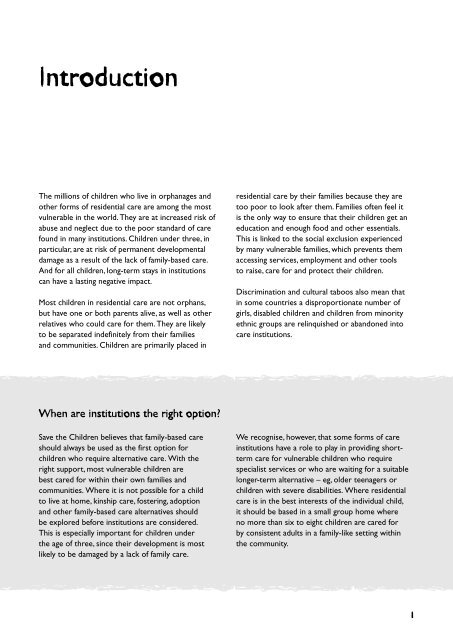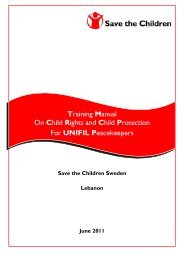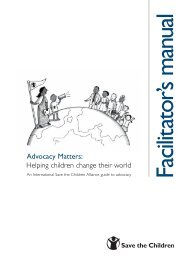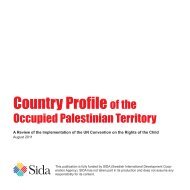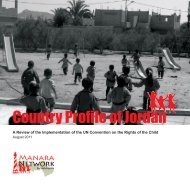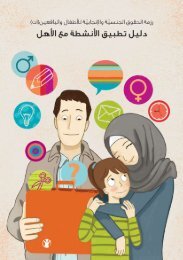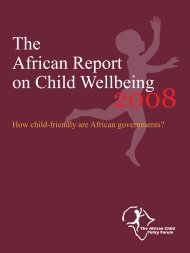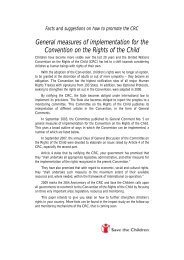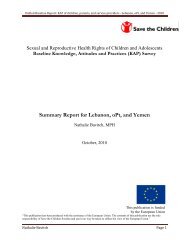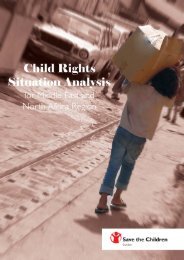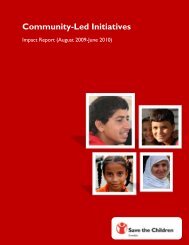Keeping Children Out of Harmful Institutions - Save the Children
Keeping Children Out of Harmful Institutions - Save the Children
Keeping Children Out of Harmful Institutions - Save the Children
You also want an ePaper? Increase the reach of your titles
YUMPU automatically turns print PDFs into web optimized ePapers that Google loves.
Introduction<br />
The millions <strong>of</strong> children who live in orphanages and<br />
o<strong>the</strong>r forms <strong>of</strong> residential care are among <strong>the</strong> most<br />
vulnerable in <strong>the</strong> world. They are at increased risk <strong>of</strong><br />
abuse and neglect due to <strong>the</strong> poor standard <strong>of</strong> care<br />
found in many institutions. <strong>Children</strong> under three, in<br />
particular, are at risk <strong>of</strong> permanent developmental<br />
damage as a result <strong>of</strong> <strong>the</strong> lack <strong>of</strong> family-based care.<br />
And for all children, long-term stays in institutions<br />
can have a lasting negative impact.<br />
Most children in residential care are not orphans,<br />
but have one or both parents alive, as well as o<strong>the</strong>r<br />
relatives who could care for <strong>the</strong>m. They are likely<br />
to be separated indefinitely from <strong>the</strong>ir families<br />
and communities. <strong>Children</strong> are primarily placed in<br />
When are institutions <strong>the</strong> right option?<br />
<strong>Save</strong> <strong>the</strong> <strong>Children</strong> believes that family-based care<br />
should always be used as <strong>the</strong> first option for<br />
children who require alternative care. With <strong>the</strong><br />
right support, most vulnerable children are<br />
best cared for within <strong>the</strong>ir own families and<br />
communities. Where it is not possible for a child<br />
to live at home, kinship care, fostering, adoption<br />
and o<strong>the</strong>r family-based care alternatives should<br />
be explored before institutions are considered.<br />
This is especially important for children under<br />
<strong>the</strong> age <strong>of</strong> three, since <strong>the</strong>ir development is most<br />
likely to be damaged by a lack <strong>of</strong> family care.<br />
residential care by <strong>the</strong>ir families because <strong>the</strong>y are<br />
too poor to look after <strong>the</strong>m. Families <strong>of</strong>ten feel it<br />
is <strong>the</strong> only way to ensure that <strong>the</strong>ir children get an<br />
education and enough food and o<strong>the</strong>r essentials.<br />
This is linked to <strong>the</strong> social exclusion experienced<br />
by many vulnerable families, which prevents <strong>the</strong>m<br />
accessing services, employment and o<strong>the</strong>r tools<br />
to raise, care for and protect <strong>the</strong>ir children.<br />
Discrimination and cultural taboos also mean that<br />
in some countries a disproportionate number <strong>of</strong><br />
girls, disabled children and children from minority<br />
ethnic groups are relinquished or abandoned into<br />
care institutions.<br />
We recognise, however, that some forms <strong>of</strong> care<br />
institutions have a role to play in providing shortterm<br />
care for vulnerable children who require<br />
specialist services or who are waiting for a suitable<br />
longer-term alternative – eg, older teenagers or<br />
children with severe disabilities. Where residential<br />
care is in <strong>the</strong> best interests <strong>of</strong> <strong>the</strong> individual child,<br />
it should be based in a small group home where<br />
no more than six to eight children are cared for<br />
by consistent adults in a family-like setting within<br />
<strong>the</strong> community.<br />
1


